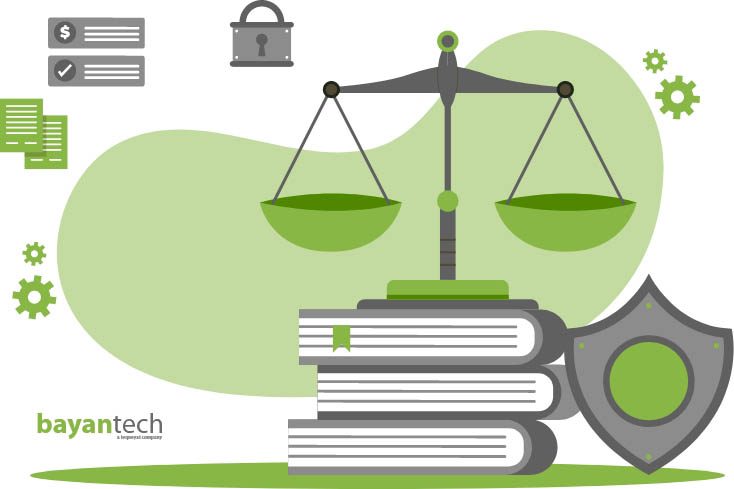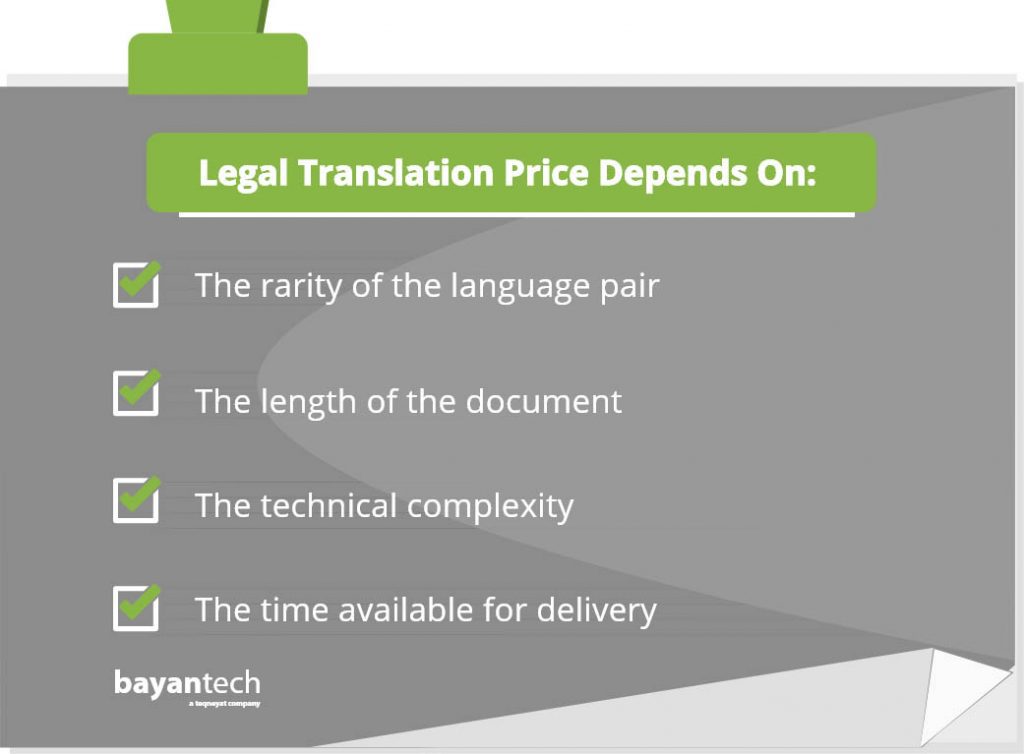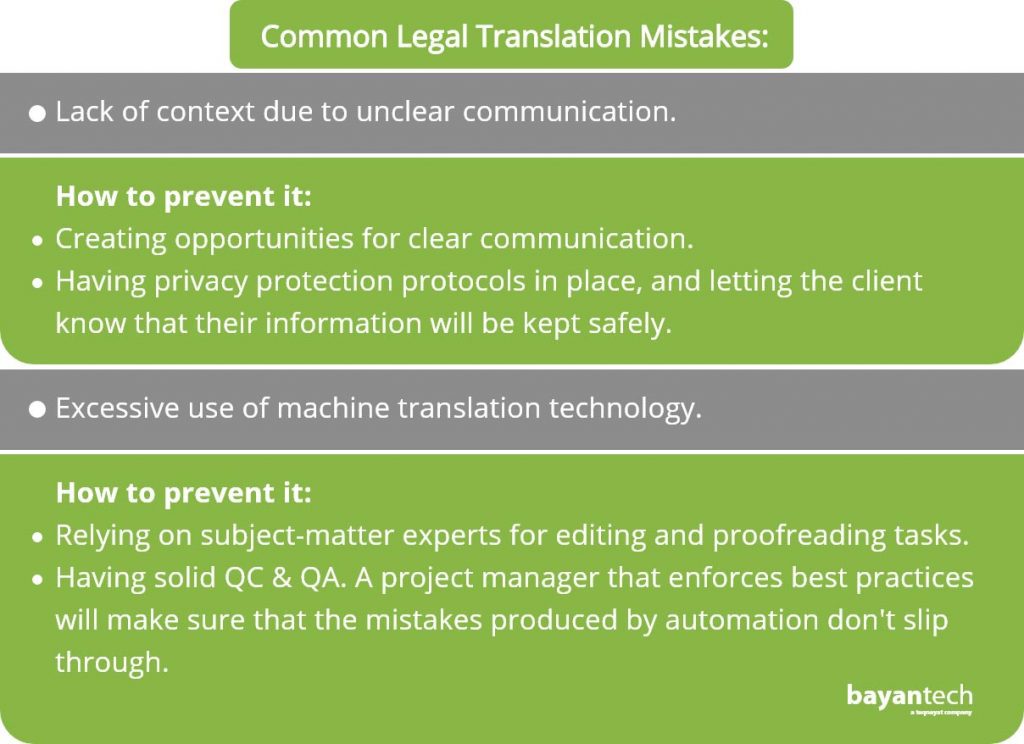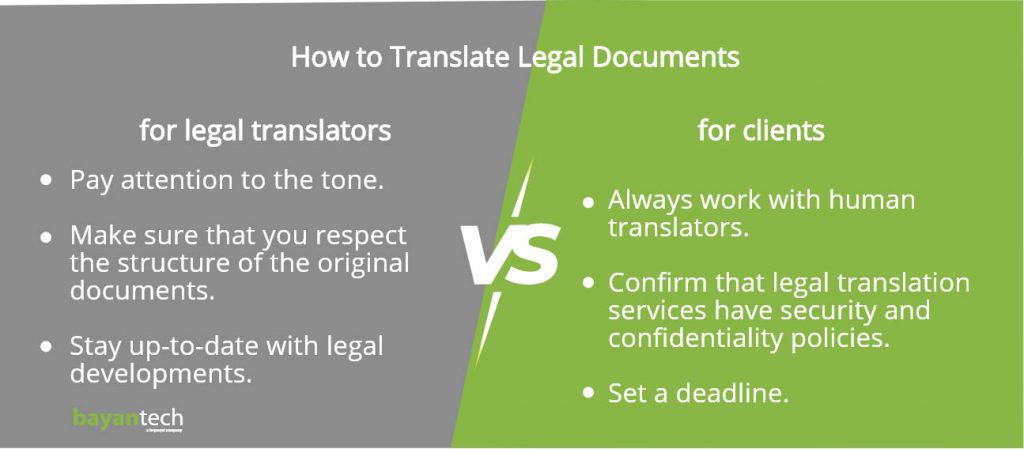In judicial settings, it’s not uncommon to dismiss legal translation as something that can be left for last. But, in fact, when a case involves people who speak a foreign language or some of the evidence is in a foreign language, legal translation services are essential. But legal translation services can’t be provided by any bilingual person. Nor can they be provided by any translator. The best option is partnering up with an expert who has extensive insight into the judicial process and legal terminology.
There are some particular challenges to legal translation that only an expert knows how to solve. For example, precision is far more important in legal settings than, for instance, in marketing. In marketing, a translator can take creative licenses and prioritize how a sentence sounds above precisely conveying the original meaning. But, in legal settings, a mistranslated word can make a tremendous difference.
Accuracy and subject-area knowledge are essential in the legal sector. And subject-area knowledge isn’t just about properly translating terminology, but also about understanding the context of that terminology. As laws and regulations change, language changes. So, it’s essential that legal translators stay updated. Last but not least, a specialist will also know how to guarantee confidentiality.
Legal documents are extremely sensitive — and occasionally confidential. Therefore, translation services providers must handle them with extreme care. An inexperienced translator who doesn’t really know how to translate legal documents can make serious mistakes and even transgress the facts of a case. Translations mistakes that go undetected could put your trial, immigration process, or contract signature at risk. Working with a quality legal translation services provider that is familiar with the languages (and dialects) at hand, as well as the sector will guarantee a fair and useful translation.
In this post, we will explain:
- The importance of legal translation services.
- Which types of documents require legal translation.
- What happens when legal translation meets marketing.
- The cost of legal translation.
- The risks of mistranslation.
- How even professional translation can go wrong.
- How to translate legal documents accurately and efficiently.
What Are Legal Translation Services?
Legal translators usually work with:
- Certificates & licenses
- Contracts
- Financial records
- Patents
- Immigration documents
- Wills & testaments
- Court transcripts, witness testimonies, and other litigation material
Legal translation isn’t the same as legal interpreting. They may be used interchangeably by non-specialists, but they’re two very distinct processes and services. While both of them may be necessary for a judicial setting, it’s worth noting:
For instance, an interpreter may help a jury understand a foreign witness’ testimony, while a translator may work with written evidence of the crime (such as text messages or letters), making it easily comprehensible for all parties involved. In this post, we’ll take a look at how to translate legal documents, so interpreting won’t be involved at all.
Legal translation is most commonly used during trials when part of the evidence consists of materials in a foreign language (what is usually called “bilingual discovery”), or for immigration purposes. It also plays a vital role during transnational business deals, as well as in the context of international academia. Contracts should be as precisely translated as possible. And research into the legal field is best translated by legal translators.
When the documents in question come from an institution in a certain country and need to be adapted to be presented before another country’s institutions, legal translation takes on a new degree of complexity. Legal terminology and conventions will need to be adapted, making it crucial for translators to be aware of both countries’ legal systems, and what’s expected from the document in question.
Legal Marketing & Translation
Marketing translation and legal translation differ in many aspects. However, when a legal service aims to expand its outreach, thinking about translation (and localization) is essential. For instance, many legal practices specialized in a specific type of case (for instance, immigration) may want to attract clients by means of content marketing. That is, by providing them with the information they need to further understand their rights and their case. Even if you’re not specialized in immigration, but offering your services in a multilingual area, it’s essential that you make your material accessible to those who don’t speak English.
Nowadays, having a social media presence and an optimized website is fundamental to reach new clients. So you should not only think about your brochures but also about your presence on the internet.
The right translator should focus on attracting your target audience, paying attention to their culture and the nuances of their language. Besides, they will make sure that slogans aren’t misleading and that all complex terms are adapted in a way that the audience will find useful.
At the beginning of the project, you and your language partner will need to examine the tone and style of the content. However, marketing materials aren’t just about good translation. Colors and images used are also important for your target audience to identify with your services more easily. If your marketing content needs non-linguistic adaptation, the service you need isn’t just translation, but localization. Localization is the adaptation of all linguistic and paralinguistic aspects of the original material, to match the needs and tastes of a new target audience.
You’ll have to partner up with linguists that specialize in marketing and business translation, and who can properly handle legal information as well. In some cases, you will also need to develop an SEO and content strategy with cross-cultural marketing professionals. In these types of scenarios, look for a cross-disciplinary translation company, with diverse industry experience.
Sign up to our newsletter to receive the latest blogs and news
The Cost of Legal Translation
If you’re looking into how to translate legal documents, you’re probably concerned about the service’s price. Choosing a service that specializes in the field of legal translation is invaluable. But, legal translations can be costly. And some may prefer to avoid adding expenses to their legal proceedings. That’s why companies and people may decide to use free automated translation tools or hire poorly trained linguists.
However, machine translation tools (and non-specialists) don’t understand the tone and legal jargon like a translator specializing in this field does. Automation will often make disastrous mistakes. So, with this in mind, paying for a language service that works with experienced human translators is worth it.
Professional legal translation fees depend on several factors. First of all, the length of the document. Some services will look at the number of words, some will measure the length in characters. But legal documents are most usually charged for word or unit. Some translation agencies offer a fixed price for the translation of a certain legal document. A birth certificate, for example.
Another factor to consider will be the language pair. If the language pair is rather unusual, considering the translation company’s location, the cost will increase. Due to the sheer number of speakers, and their geographical distribution, your preferred LSP is likely more used to translating from English to Spanish than from Chinese to Bulgarian. A translation agency will probably have fewer linguists available for that combination.
Translation agencies will also take into account the complexity of the service and the deadline. Translating advertising brochures is not the same as translating legal documents with specialized jargon. A legal document will most likely require more intensive quality control, to guarantee technical precision, not just naturality. Considering what we mentioned in the introduction, that legal translation is usually left for last, it’s not odd for the translation of legal documents to be requested urgently. In those cases, the translators must work quickly while maintaining clarity and accuracy – which will increase the price.
So in legal translation, the price will depend on the rarity of the language pair, the length of the document, its technical complexity, and the time available for delivery.
If you want to know the cost of translating your document quickly and transparently, you should request a quote.
The Risks of Mistranslation
Especially if you’re an immigrant, or you’re facing a legal process with a tight budget, you may be wondering how to translate legal documents yourself. Or, if you can have a bilingual friend or relative translate these documents for you.
In some cases, authorities may require that your legal documents are certified or affidavit. This certification will let the institution in question know that the document has been translated by a reliable, professional linguist. But, even if you don’t have to present a certified or notarized translation, if you’re in need of translation services, you should contact professionals.
In 2012, Canadian supervisor Anthony Hill nullified a trial for sexual assault against a Hindi-speaking foreigner living in Canada on a work visa. As the American Psychological Association reported, the victim’s testimony had been severely mistranslated.
A similar case took place in California, in 2010 when a judge dismissed the case against Cathy Mendoza, a Spanish-speaking immigrant who had previously been declared guilty of homicide.
In these types of settings, mistranslations carry a human cost. From declaring an innocent guilty to delaying someone’s search for justice. But courts aren’t the only places where legal translation services can make a difference. If you’re an immigrant, a mistranslation could delay your process anywhere from months up to years.
If the document in question is a contract, a mistranslation could actually take you to the courtroom, since the unclear or inaccurate translation could be interpreted as intentional deception on your part.
Common Legal Translation Mistakes
Even professional legal translators can make mistakes that hinder the quality of their output. These mistakes are usually related to miscommunication or an erred use of the translator’s tools.
A legal language services provider should make sure that they understand the context of the document in question. The project manager or linguist should foster opportunities for clear communication, to which the client should respond with as much contextual information as possible.
The client may hold back relevant information, or be intentionally vague, out of fear of the language services provider disclosing or mishandling that information. That’s why it’s vital for those providing this sort of service to transmit trust. The most trustworthy companies are those implementing processes that protect the clients’ privacy and make the company liable if the information is mishandled or leaked.
Another potential cause for an improper translation is the excessive use of machine translation technology. While machine translation can be a priceless tool for translators, results can be disastrous if it’s doing more than its fair share of heavy lifting.
Expert translation companies will use machine translation for a rough first draft, but will immediately pass the document through a team of legal translation experts that apply their legal and cross-cultural knowledge to the document.
How to Translate Legal Documents
If you’re a linguist entering the discipline of legal translation, you could be wondering what are some legal document translation best practices. How to translate a legal document in an efficient and reliable way? There are three key best practices for the translation of official and legal documents you’ll need to have in mind:
Pay attention to the tone. The tone of the translation should be the same as that of the original document. This is particularly important when translating testimony transcripts.The structure and organization of the document is fundamental.
Make sure that you respect the structure of the original documents. This is both the case for the general layout of the document, and its sentences. If certain linguistic structures do not exist in the target language, the translator must find their equivalents so that they convey the message identically.
Laws are constantly changing. Make sure you’re up-to-date with legal developments. Get used to the terminology of the source and target countries. A legal concept may not exist in your target country, or a word in your source language can mean the opposite in the target language. An experienced translator should know how to solve it.
If you’re looking for a legal translation services provider, remember to:
Always work with human translators. Automation is not capable of doing this job. The specialist’s knowledge and experience give legal translation a unique value. Machine translation is often unable to reflect new legal developments. Or it can’t truly capture terminological specificities.
Confirm that legal translation services have security and confidentiality policies. Legal documents include sensitive information that should not be disclosed. Carelessness can have unforeseen negative consequences.
Set a deadline. Deadlines for legal translation must be strict. Delays in the service can interrupt the course of your legal process.
If you need to have legal documents translated, your best option is a translation company that specializes in legal document translation services. Make sure you work with professional translators who guarantee a cost-efficient and timely process without neglecting quality. The right linguists can make a world of difference, making sure you close that deal, advance in your immigration process, or attain justice. Even if you can save money on an inexperienced linguist, in the long run, inaccurate translations end up being far more expensive. At bayantech, we have extensive experience in legal translations. Contact us and request a free translation quote.
Discuss Your Legal Translation Needs
















